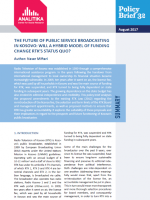The Future of Public Service Broadcasting in Kosovo: Will a Hybrid Model of Funding Change RTK’s Status Quo?
The Future of Public Service Broadcasting in Kosovo: Will a Hybrid Model of Funding Change RTK’s Status Quo?
Author(s): Naser Miftari
Subject(s): Politics, Media studies, Communication studies, Policy, planning, forecast and speculation, Public Finances
Published by: Analitika – Centar za društvena istraživanja
Keywords: Kosovo; media; public service broadcasting; future; hybrid model; RTK; finances;
Summary/Abstract: Radio Television of Kosovo was established in 1999 through a comprehensive international assistance program. In the years following the handover from international management to local ownership its financial situation became increasingly vulnerable. In 2009, ten years after it went on air, the license fee, which was paid by all households in Kosovo and was the main source of funding for RTK, was suspended, and RTK turned to being fully dependent on state funding in subsequent years. The growing dependence on the state budget has also eroded its editorial independence and credibility. This policy brief analyses the proposed amendments to the existing RTK Law (2012) regarding the re-introduction of the license fee, the selection and term limits of the RTK Board and management appointments, as well as proposed methods to ensure that RTK has greater accountability. It explores the suitability of these proposals and their implications in regard to the prospects and future functioning of Kosovo’s public broadcaster.
Series: ANALITIKA — Policy Brief
- Page Count: 9
- Publication Year: 2017
- Language: English
- Content File-PDF

